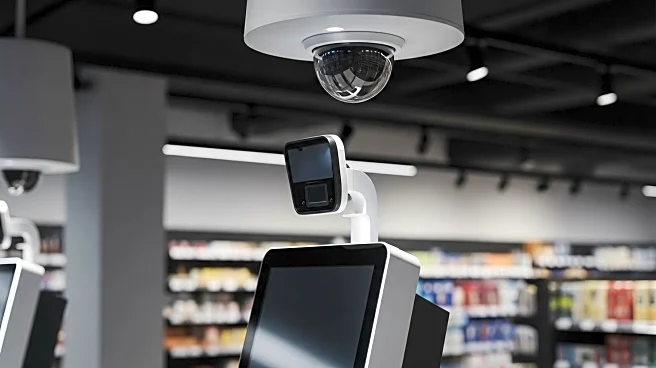What's Happening?
The Long Beach City Council has enacted a pioneering ordinance aimed at regulating self-checkout lanes in retail stores to curb theft and enhance customer service. The 'Safe Stores Are Staffed Stores' ordinance, effective since September, mandates that larger drug and food retail stores maintain a staffing ratio of one employee per three self-checkout kiosks. Additionally, it restricts the use of self-checkouts to transactions involving 15 items or fewer and prohibits the purchase of locked items through these lanes. The ordinance also requires stores to operate a staffed checkout lane before any self-checkout stations are used. This measure comes in response to surveys indicating that self-checkout lanes contribute to 20% to 25% of retail theft losses. The ordinance has led to the closure of self-checkout lanes in at least four Albertsons Companies grocery locations in Long Beach.
Why It's Important?
The ordinance represents a significant shift in retail operations, prioritizing theft prevention and customer service over convenience. By enforcing stricter staffing requirements, the measure aims to reduce opportunities for theft and improve customer assistance. However, it has sparked opposition from the Long Beach Area Chamber of Commerce and the California Grocers Association, who argue that the ordinance could lead to increased grocery prices and inconvenience for shoppers. The ordinance's impact on retail theft and store operations could set a precedent for similar policies in other cities, potentially influencing national retail practices and labor dynamics.
What's Next?
The ordinance's success in Long Beach could encourage other cities to adopt similar measures, as proponents like Derek Smith from UFCW local 324 hope. The union aims to expand the ordinance's reach beyond Long Beach, emphasizing the importance of worker support across various locations. Meanwhile, the California Grocers Association and other opponents may continue to lobby for adjustments to the ordinance, citing concerns over its economic impact and practicality. The ongoing debate highlights the balance between theft prevention and maintaining consumer convenience in retail environments.
Beyond the Headlines
The ordinance raises broader questions about the role of automation in retail and its implications for employment. As self-checkout technology becomes more prevalent, the need for human oversight and customer service remains crucial. This development underscores the tension between technological advancement and job security, prompting discussions on how to integrate automation without compromising workforce stability. Additionally, the ordinance may influence future legislative efforts to address retail theft and consumer protection at a larger scale.









